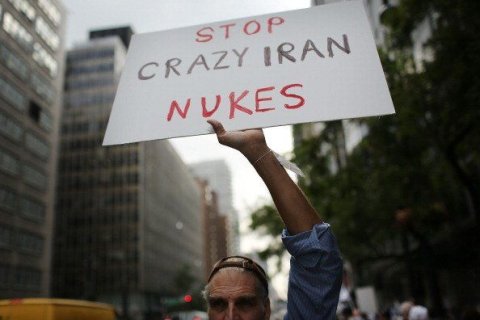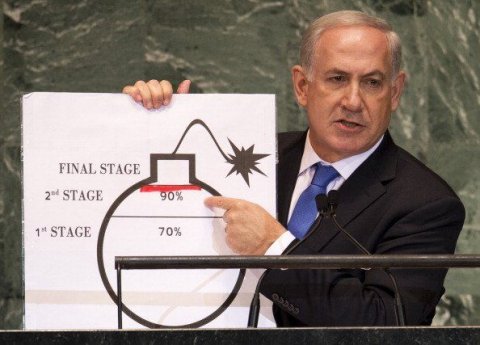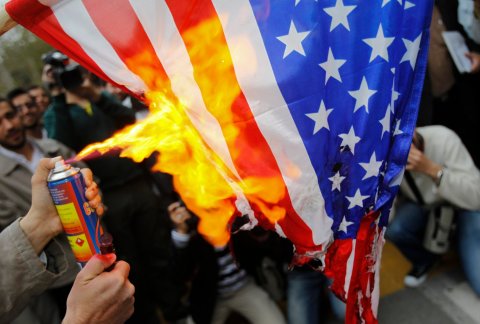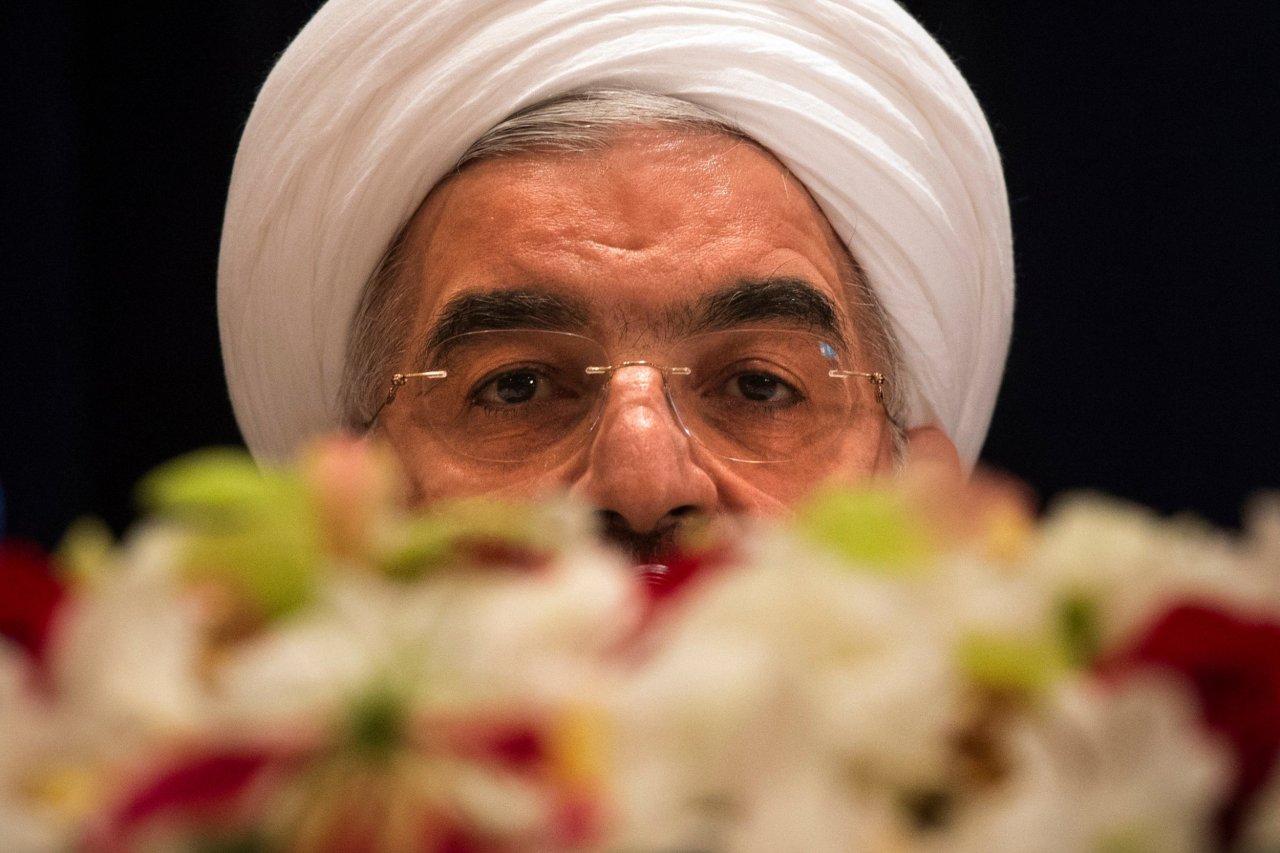While he was vice president in the previous administration, Dick Cheney repeatedly insisted America needed to bomb the Iranians to snuff out their nuclear ambitions; so did Senator John McCain and innumerable other politicians – Republican and Democrat, domestic and foreign.
But what if it's all hysteria? Could Iran be little more than a phantom menace?
Interviews with military strategists and foreign and domestic intelligence officers, and a review of the 34 years of warnings about the Iranians' threat to America's vital interests, all show that the doomsaying is based on suspicion, supposition and precious little hard data. It is, in many ways, a repeat of the supposed threat from Iraq that led to war – except this time, the intelligence world knows there are no weapons of mass destruction.
Now, with signs of a potential thaw in the relationship between the United States and Iran, numerous experts on the region say it is vitally important to have an accurate picture of the Persian Gulf state's nuclear capabilities and aspirations. Last week, President Barack Obama spoke by telephone for 15 minutes with Iran's recently elected president, Hassan Rouhani – the first time leaders of the two countries have spoken in three decades – and they discussed this nuclear issue. The conversation, which enraged hard-liners in the United States, Israel and Iran, was a prominent step in a diplomatic dance by the White House that began shortly before Rouhani assumed the presidency in August.

Among the biggest naysayers was Israeli Prime Minister Benjamin Netanyahu, who dismissed the tête-à-tête as foolishness, and sneered that Obama had been seduced by a deceitful campaign of smiles by Rouhani.
Moreover, Netanyahu said, there was reason to be deeply afraid of Iran's nuclear program. "Within three to five years, we can assume that Iran will become autonomous in its ability to develop and produce a nuclear bomb, without having to import either the technology or the material," he said. "[The nuclear threat] must be uprooted by an international front headed by the U.S."
Wait … sorry. That was not a quote from Netanyahu about the Obama-Rouhani conversation. That came from a speech he delivered to a near-empty Knesset plenum in January 1995. That's right: Netanyahu demanded that the United States take action against Iran because it would soon develop nuclear weapons 18 years ago. In other words, Netanyahu's track record on this topic is so lousy.
For a better assessment, try the United States Army War College, which, as that branch's most senior military educational institution, trains high-level Army personnel in strategy and research. "Iran is not a threat to American vital interests,'' says Christopher J. Bolan, a former army intelligence officer who served on the national security staffs of vice presidents Gore and Cheney, and who now teaches military strategy at the war college. "They don't want nuclear weapons. I think it has just been overly alarmist when folks are advocating a more aggressive reaction."
That is similar to the conclusion in the 2007 National Intelligence Estimate, an authoritative assessment of national security issues that reflects the judgments of 16 American intelligence agencies. According to that analysis, Iran suspended its nuclear weapons program in 2003, and earlier this year, then-Secretary of Defense Leon Panetta said, "The intelligence we have is [Iranian leaders] have not made the decision to proceed with the development of a nuclear weapon.''
Iran is not a threat to American vital interests. They don't want nuclear weapons.
Some hard-liners in the West insist that such reasoned analysis and predictions cannot be applied to Iran because its leaders are lunatics. But, according to one Pentagon intelligence official, government security agencies worldwide have concluded that Iran's leadership is level-headed and its decisions are reached in a formalized way.
"They are not crazy, and they are not stupid,'' says Gawdat Bahgat, a professor of national security affairs who specializes in Middle Eastern policy at the National Defense University, an institution chartered by the Joint Chiefs of Staff that provides high-level military training on national security strategy. "They are rational; they see that making the bomb is not in their best interest.''
There is another wrinkle here: Ayatollah Ali Khamenei, Iran's supreme leader, formally renounced nuclear armaments in a fatwa – a binding religious ruling – in which he declared the possession of such weapons to be "a grave sin." It is possible that pronouncement could be reversed but at a significant cost to the credibility of the cleric within the Islamic community.
And what about Iran's supposed threat to Israel? American military officials – such as General Martin Dempsey, the chairman of the Joint Chiefs – have publicly stated that the Jewish nation has little to fear; Iran's leaders know that an attack on Israel would mean the destruction of their own country by Western military forces. Even top Israeli officials have conceded as much. "I think Israel is strong enough to protect itself,'' Efraim Halevi, the former director of Mossad, that country's top intelligence service, said last year. "I think, ultimately, it is not in the power of Iran to destroy the state of Israel.''

Shortly after Rouhani's speech before the United Nations last week, Republican Congressman Mike Rogers of Michigan, head of the House Intelligence Committee, demanded that Iran end production of "over 20% enriched uranium" – that is, weapons-grade material – before any nuclear talks commence.
The problem: Iran doesn't have weapons-grade material. The International Atomic Energy Agency reported in August that Iran has produced only low-enriched uranium for civilian nuclear projects and is keeping its stock at a fairly constant level.
Of course, Iran could reverse course and start churning out more highly enriched uranium – but not, current and former intelligence officials say, without Western intelligence agencies finding out almost immediately, making such a decision akin to suicide for the Persian Gulf state. "Iran has made progress during the past year that better positions it to produce weapons-grade uranium using its declared facilities and uranium stockpiles, should it choose to do so,'' James Clapper, the director of national intelligence, testified before the Senate Intelligence Committee this year. "Despite this progress, we assess Iran could not divert safeguarded material and produce a weapon-worth of WGU before this activity is discovered."
Not to pick on Congressman Rogers, but it's also clear that some policymakers don't understand how hard it is to make a nuclear bomb. Iran could not simply obtain weapons-grade material, snap a warhead onto a missile and start blowing up parts of the world. Engineering a delivery mechanism, testing of the weapons themselves and taking innumerable other steps would be required before Iran could be a credible threat. Pakistan could develop a bomb slowly, without worrying that perturbed Western nations would attack; Iran doesn't have that luxury. "Even if they manage to get sufficient enriched uranium, it is going to be years before they can weaponize it,'' says Bolan. "The timeline is not urgent. We have years, if that is the objective of the government, which, again, I think is a pretty questionable claim.''

What accounts for the paranoia about Iran's nuclear capabilities? The biggest legitimate complaint is that Iran's recent cooperation with the IAEA has been spotty. Because of intelligence suggesting the country once conducted nuclear tests with possible military applications inside a military complex called Parchin, inspectors have been demanding access to a facility there. The Iranians insist that the facility is used solely for conventional weapons, and argue that IAEA inspectors visited the site in 2005 without discovering anything untoward. Perhaps the Iranians are telling the truth, perhaps not. But they have a very good reason to keep the world guessing.
Since the Islamic Revolution of 1979, there have been consistent and loud calls from the United States for regime change in Iran. Experts say that makes the Iranians suspicious about the intentions of the American government: Is Washington really worried about weapons, or are officials looking for ways to overrun the Shia government?
That puts Iran in a difficult position. Its leaders fear that if they unilaterally eliminate the prospect that they could develop a defensive nuclear weapon, they will open themselves up to a possible invasion. However, they know that if they start building a bomb, they will be attacked with the full force and fury of the American military.
But America faces an equally complex scenario should it choose to attack Iran. Such an assault, strategists say, would play directly into the al-Qaeda narrative that the United States is waging war on Islam. "If we bomb them, there will be more instability in the Middle East,'' says Bahgat, the national security affairs professor. "The Iranians know they cannot fight the United States, one army against another army. Because of this, they have developed other means to make us pay a high price if we attack them. There are religious and political ties between Shia in many different countries, and there is little doubt that they would retaliate in any way they can. They will make a military decision quite expensive for us." Terrorist groups, the only realistic means for Iran to fight back, could well attack in the Strait of Hormuz, the sole sea passage from the Persian Gulf to the open sea, which is critical for the transport of Middle Eastern oil to the West.
The Iranians know they cannot fight the United States, one army against another army. Because of this, they have developed other means to make us pay a high price if we attack them.
Even worse, such an attack would buy only a few years' delay in Iran's capability to develop a nuclear weapon, according to a highly placed former American intelligence official and strategic experts, and would provide the hard-liners there with proof that the nation needs weapons of mass destruction to serve as a deterrent.
All this, military strategists say, is why negotiating with Iran is the smart play. Both countries understand the calculus of this stalemate. "It would be easy to reach a deal with Iran,'' Bahgat says. "We have a fair degree of common ground that will help [us] come to an agreement [that is] in everybody's interests. I believe a deal could be made in three months.''
That might strike many as overly optimistic, but it's also true that more than 30 years of warnings about Iran's impending nuclear capabilities have yet to pan out.























